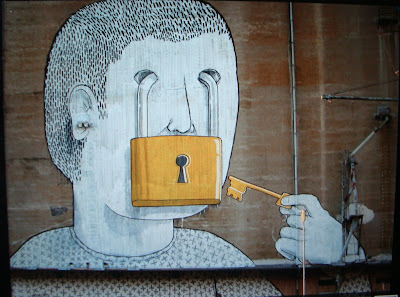 Well, it must be summer, because I have become lazy about posting. Here in Manhattan we are in "Hochsommer." I went out early this morning for a bike ride along the Hudson, trying to beat the heat. A nice river breeze. It's funny how the beginning of summer makes me think I have time to accomplish many things. One thing I have to do this summer is to give a talk, on August 4, on the history of freedom of speech at the New York Public Library. What I hope to get across in my talk is that the discomforts we are now experiencing in connection with speech -- especially the issue of "hate speech" -- were already present in the 18th century. Despite the claim that is attributed to Voltaire -- "I disapprove of what you say, but I will defend to the death your right to say it" -- I can't think of a single philosophe who imagined that freedom of speech should apply to ordinary citizens.
Well, it must be summer, because I have become lazy about posting. Here in Manhattan we are in "Hochsommer." I went out early this morning for a bike ride along the Hudson, trying to beat the heat. A nice river breeze. It's funny how the beginning of summer makes me think I have time to accomplish many things. One thing I have to do this summer is to give a talk, on August 4, on the history of freedom of speech at the New York Public Library. What I hope to get across in my talk is that the discomforts we are now experiencing in connection with speech -- especially the issue of "hate speech" -- were already present in the 18th century. Despite the claim that is attributed to Voltaire -- "I disapprove of what you say, but I will defend to the death your right to say it" -- I can't think of a single philosophe who imagined that freedom of speech should apply to ordinary citizens.Thus, Condorcet was not saying anything controversial when, in 1776, he defined public opinion as "that of the stupidest and most miserable section of the population." Condorcet was one of the godfathers of the French Revolution. And though freedom of opinion and the communication of ideas were included in the National Assembly's Declaration of the Rights of Man and of the Citizen (articles 10 and 11), Condorcet became a victim of the revolution, dying in prison in 1794 after having been a fugitive from the revolutionary authorities.
Rousseau's "general will" is a problematic concept, but one thing it is not is majority opinion. In fact, Rousseau was against debate and dissent, which indicated "the ascendence of private interests and the decline of the state" (The Social Contract, 1762). In the general will citizens should surrender their private interests and opinions, a surrender that happens in silence. The general will, he wrote, can only emerge from a popular assembly, "provided its members do not have any communication among themselves."
Most philosophes thought the government, with their assistance, should guide the public's minds. In their demands for "progress," the philosophes failed to see the emergence of a society of individuals who would be free to pursue their own self-interest, regardless of the claims of truth, and in the process produce the plethora of competing claims and viewpoints that characterize the public square today -- all the while managing to live together amidst the clash of conflicting opinions, without the society descending into the Hobbesian chaos so many philosophes feared.
Ordinary people in the West, where notions of individual freedom are something like second nature, manage to live amid competing opinions, even if many opinions offend their sensibilities. It is one of the prices we pay for living in a society in which we can go about our own business without the meddling of authorities. Unfortunately, too much "enlightened" opinion today would like things to be more orderly. Like the 18th-century philosophes, our 21st century commentariat is uncomfortable when ordinary citizens have different priorities. Thus, the commentariat's claim, like Condorcet in the 18th century, that the public is "stupid."
Picture credit: BLU


No comments:
Post a Comment